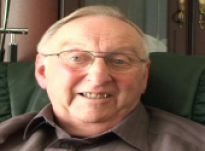Brian - Interview 06

More about me...
We interviewed Brian twice about his experience of taking part in a new research programme involving screening for previously unrecognised heart valve disease. Brian and his wife were both invited to participate in the screening research. They both decided straightaway to take part, for their own health benefit as well as to help other people through the research. Brian’s wife told the staff she was worried she would have difficulty lying on her side for the screening, but they said they would give it a go anyway, and in the end they managed to get round the problem. She was told she had no heart valve problems, but Brian was told he had a small leak in one valve. He was reassured by the staff that it was unlikely to give him any major problems, and he is waiting to hear whether he will need a follow-up appointment at hospital and further tests.
If you find out you have a heart valve problem, Brian wonders if this will affect your chances of getting holiday insurance.
If you find out you have a heart valve problem, Brian wonders if this will affect your chances of getting holiday insurance.
That’s true, yeah, because I mean I like to tell the truth on anything that I’m dealing with. I mean, I won’t tell a lie to anybody, and do you have to declare it or don’t you declare it? Even if it’s something that is, it’s not bothering you in any way, but should you tell them that, you know, that you’ve had this done and been told?
Helping other people is important to Brian and his wife, and it was an easy decision to take part. It's good if it helps him too.
Helping other people is important to Brian and his wife, and it was an easy decision to take part. It's good if it helps him too.
Oh, no, no, no.
Brian is happy for any of his organs to be used for transplant or research. He is in favour of animal research if it can benefit people.
Brian is happy for any of his organs to be used for transplant or research. He is in favour of animal research if it can benefit people.
I’d be happy with either, yes.
Brian has been asked to take part in more research since and feels 'you can be pestered with too many' invitations. He's happy with this study but won't take part in any others unless it's relevant to his health (for example on polio).
Brian has been asked to take part in more research since and feels 'you can be pestered with too many' invitations. He's happy with this study but won't take part in any others unless it's relevant to his health (for example on polio).
Only to do with what I’m, a follow up on this one, yeah, I’m quite willing to carry on following up on this one. But I won’t take any part in any in future. Unless it’s something to do with, I mean, if there was something to do with the polio or something like that which do involve me, then obviously I would take part in anything to do with that.
Brian couldn't fault the way the technician explained it all. She showed him the pictures on the screen.
Brian couldn't fault the way the technician explained it all. She showed him the pictures on the screen.
There was no trouble. It all went everything smooth.
Brian had experienced some chest discomfort in the past but tests had showed nothing was wrong. He was surprised and a little concerned to discover he had a leaky valve.
Brian had experienced some chest discomfort in the past but tests had showed nothing was wrong. He was surprised and a little concerned to discover he had a leaky valve.
It wasn’t frightening, but it was, you feel as if you’re concerned about it, you know. It don’t make you feel as if you don’t just ignore it or whatever. You know, you’ve got it in the back of your mind that there is something there.
At his follow up appointment Brian was told he might have a problem with two valves, rather than just one. But he was told it was very minor in both cases and nothing to be concerned about.
At his follow up appointment Brian was told he might have a problem with two valves, rather than just one. But he was told it was very minor in both cases and nothing to be concerned about.
Not really, no. I mean, obviously if it had, if they had have said there was something more and something had to be done then I would have to think about it seriously more then. But they said there’s no problem with it, so that was what I took for gospel, you know [laughs].
Generally Brian feels fit. He is concerned about his heart valve problem and whether it can be treated but does not worry a lot. At his age you expect a certain amount of illness.
Generally Brian feels fit. He is concerned about his heart valve problem and whether it can be treated but does not worry a lot. At his age you expect a certain amount of illness.
Well, I would feel concerned, but I would have to accept that it was a thing of life, especially at my age. Then you’ve got to think, getting to my age now, you’re going to get these things come along, which probably may concern you, or may not. But I suppose it’s a thing with age, I look at it, in lots of things.

